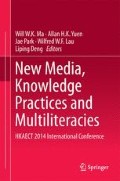Abstract
The purpose of this study was to determine the effects on student achievement in mathematics when project-based learning with the support of technology is used as instructional approach rather than a traditional instructional approach with integrated technology. The research examined the differences in student achievement in mathematics between two charter schools in Chicago. It also examined teacher perceptions about project-based learning and/or technology as an instructional approach to improve learning and student achievement outcomes. The results revealed that there were statistically significant differences in student achievement between schools that used project-based learning as an instructional approach and schools that used a traditional instructional approach.
Access this chapter
Tax calculation will be finalised at checkout
Purchases are for personal use only
References
America’s Promise Alliance. (2006). Every child, every promise: turning failure into action. Alexandria: Author.
Blair, N. (2012). Technology integration for the new 21st century learner. Principal, 91(3), 8–11.
Bogira, S. (2013, November 13). A better goal for CPS. Retrieved from http://www.chicagoreader.com
Dudeney, G., & Hockly, N. (2012). ICT in ELT: How did we get here and where are we going? English Language Teachers Journal, 66(4), 533–542.
Franklin, C., & Molebash, P. (2007). Technology in the elementary social studies classroom: Teacher preparation does matter. Theory and Research in Social Education, 35(2), 153–173.
Greaves, T., Hayes, J., Wilson, L., Geilniak, M., & Peterson, R. (2010). The technology factor: Nine keys to student achievement and cost effectiveness. Shelton: MDR.
James, D. W., Jurich, S., & Estes, S. (2001). Raising minority academic achievement: A compendium of education programs and practices. Washington, DC: American Youth Policy Forum.
Johnson, D. W., & Johnson, R. T. (1998). Making cooperative learning work. Theory into practice, 38 (2), 67–73.
Lavin, A., Korte, L., & Davies, T. (2009). The impact of classroom technology on student behavior. Journal of Technology Research, 2, 1–13.
Lombardi, M. (2007). Authentic learning for the 21st century: An overview. ELI Publication, 1. Retrieved from https://neteducause.edu/ir/library/pdf/ELI3009.pdf
Magner, T., Soule, H., & Wesolowski, K. (2011). The partnership for 21st century skills-framework for 21st century learning. Retrieved files.eric.ed.gov.ezproxy.bethel.edu/fulltext/ED543030.pdf
Moeller, B., & Reitzes, T. (2011). Integrating technology with student centered learning. Education Development Center. Retrieved from http://www.nmefoundation
National Academy of Sciences. (1997). Preparing for the 21st century: The education imperative. Retrieved from http://www.nas.edu/21st/education
Northwest Evaluation Association. (2011). RIT scale norms study. Retrieved from http://legacysupport.nwea.org/sites/www.nwea.org/files/resources/NWEA%202011%20Norms%20Report_01.17.2012_2.pdf
Partnership for 21st Century Skills. (2002). Learning for the 21st century: A report and MILE guide for 21st century skills. Washington, DC: Partnership for 21st Century Skills. Retrieved from http://www.p21.org/storage/documents/P21_Report.pdf
Prince, M., & Felder, R. M. (2006). Inductive teaching and learning methods: Definitions, comparisons, and research bases. Journal of Engineering Education, 95(2), 123–138.
Roblyer, M. D. (2003). Integrating educational technology into teaching. Upper Saddle River: Merrill Prentice Hall.
Roekel, D. (2008). Technology in schools: The ongoing challenge of access, adequacy and equity. National Education Association Policy Brief. Retrieved from http://www.nea.org/assets/docs/PB19_Technology08.pdf
Shih, J. L., Chuang, C. W., & Hwang, G. J. (2010). An inquiry-based mobile learning approach to enhancing social science learning effectiveness. Educational Technology and Society, 13(4), 50–62.
Spires, H. A., Hervey, L. G., Morris, G., & Stelpflug, C. (2012). Energizing project-based inquiry: Middle-grade students read, write, and create videos. Journal of Adolescent and Adult Literacy, 55(6), 483–493.
Zhao, Y., & Frank, K. A. (2003). An ecological analysis of factors affecting technology use in schools. American Educational Research Journal, 40, 807–840.
Zhao, Y., Pugh, K., Sheldon, S., & Byers, J. L. (2002). Conditions for classroom technology innovations. Teachers College Record, 104(3), 482–515.
Author information
Authors and Affiliations
Corresponding author
Editor information
Editors and Affiliations
Rights and permissions
Copyright information
© 2015 Springer Science+Business Media Singapore
About this paper
Cite this paper
Branch, L.J. (2015). The Impact of Project-Based Learning and Technology on Student Achievement in Mathematics. In: Ma, W., Yuen, A., Park, J., Lau, W., Deng, L. (eds) New Media, Knowledge Practices and Multiliteracies. Springer, Singapore. https://doi.org/10.1007/978-981-287-209-8_24
Download citation
DOI: https://doi.org/10.1007/978-981-287-209-8_24
Published:
Publisher Name: Springer, Singapore
Print ISBN: 978-981-287-208-1
Online ISBN: 978-981-287-209-8
eBook Packages: Humanities, Social Sciences and LawEducation (R0)

